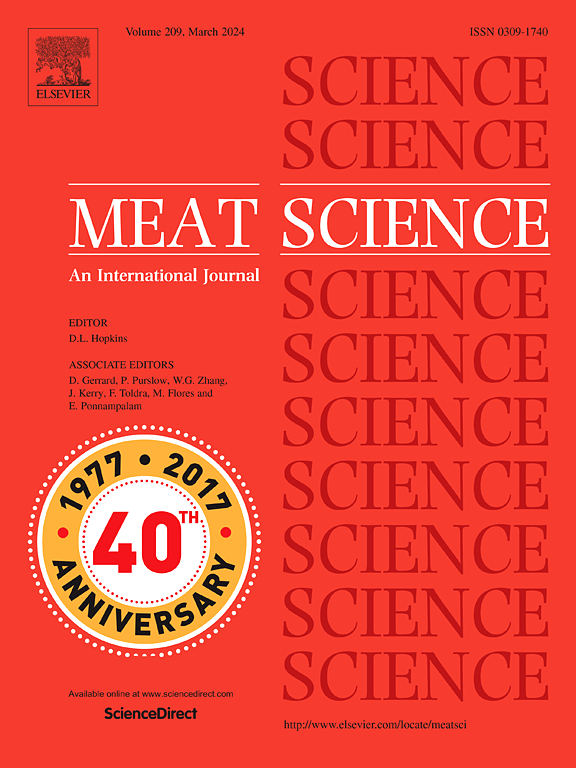Dose-dependent effects of dietary curcumin nano-micelles on the quality characteristics of Longissimus lumborum muscle in fattening lambs during extended freezing storage
IF 7.1
1区 农林科学
Q1 Agricultural and Biological Sciences
引用次数: 0
Abstract
The current study evaluated the impact of dietary curcumin nano-micelles (CNM) on the quality of Longissimus lumborum (LL) muscle in lambs during long-term freezing storage. Thirty-two crossbred male lambs were assigned into four groups receiving 0, 20, 40, or 80 mg CNM daily over a 97-day fattening period. Meat samples were analyzed for quality attributes over nine months of freezing. Supplementation with CNM, especially at 40 mg, improved carcass characteristics and reduced saturated and branched-chain fatty acids. Notably, CNM preserved meat color, enhanced water-holding capacity, and reduced drip and cooking losses, with the 40 mg dosage showing the most significant effects. While meat tenderness was unaffected, CNM exhibited antioxidant properties by reducing lipid peroxidation and stabilizing enzyme activities and total antioxidant capacity. These results indicate that CNM, particularly at 40 mg, enhances meat quality during long-term freezing, especially after six months. The findings underscore CNM's potential as a natural additive to improve lamb meat stability and quality during extended frozen storage, with implications for both the meat industry and consumer satisfaction.
饲料中添加姜黄素纳米胶束对育肥羔羊长腰最长肌品质特性的剂量依赖性影响
本研究评估了饲料中添加姜黄素纳米胶束(CNM)对长期冷冻储存羔羊腰最长肌(LL)质量的影响。将32只杂交公羔羊分为4组,每天分别饲喂0、20、40和80 mg CNM,育肥期为97 d。在9个月的冷冻过程中,对肉类样品的品质进行了分析。添加CNM,特别是添加40 mg时,改善了胴体特性,减少了饱和脂肪酸和支链脂肪酸。值得注意的是,CNM保存肉的颜色,提高了保水能力,减少了滴水和蒸煮损失,其中40毫克的剂量效果最显著。虽然肉的嫩度不受影响,但CNM通过减少脂质过氧化和稳定酶活性和总抗氧化能力表现出抗氧化特性。这些结果表明,CNM,特别是40毫克的CNM,在长期冷冻中,特别是在六个月后,可以提高肉的品质。研究结果强调了CNM作为一种天然添加剂的潜力,可以改善羊肉在长时间冷冻储存期间的稳定性和质量,这对肉类行业和消费者满意度都有影响。
本文章由计算机程序翻译,如有差异,请以英文原文为准。
求助全文
约1分钟内获得全文
求助全文
来源期刊

Meat Science
工程技术-食品科技
CiteScore
12.60
自引率
9.90%
发文量
282
审稿时长
60 days
期刊介绍:
The aim of Meat Science is to serve as a suitable platform for the dissemination of interdisciplinary and international knowledge on all factors influencing the properties of meat. While the journal primarily focuses on the flesh of mammals, contributions related to poultry will be considered if they enhance the overall understanding of the relationship between muscle nature and meat quality post mortem. Additionally, papers on large birds (e.g., emus, ostriches) as well as wild-captured mammals and crocodiles will be welcomed.
 求助内容:
求助内容: 应助结果提醒方式:
应助结果提醒方式:


